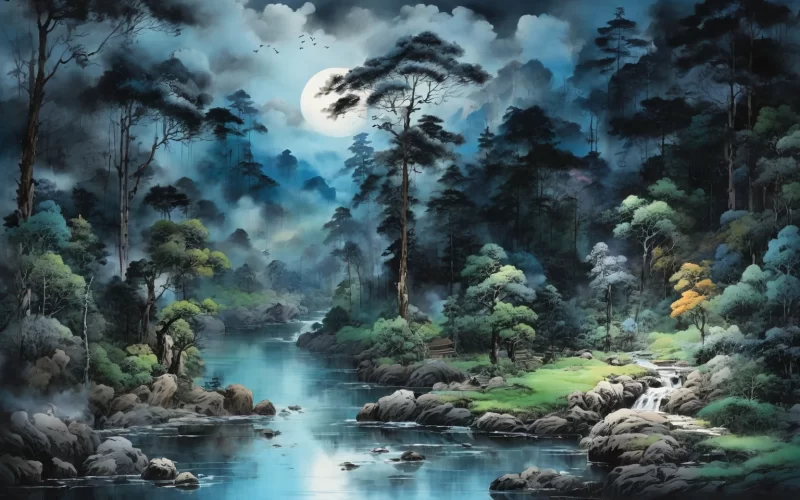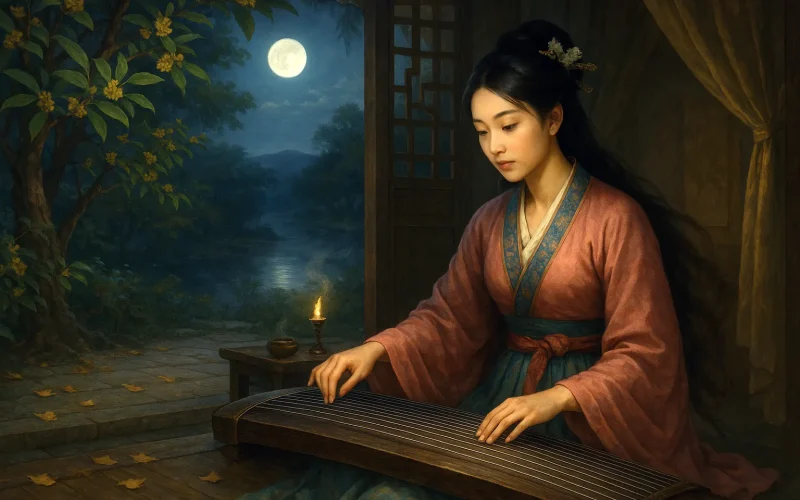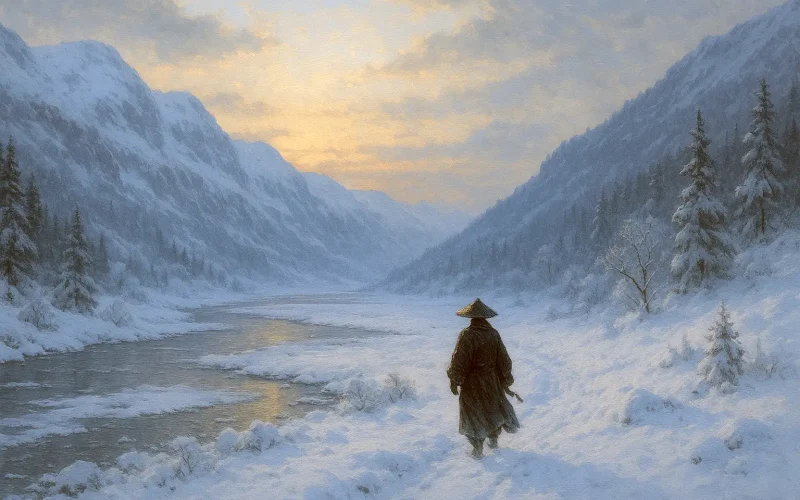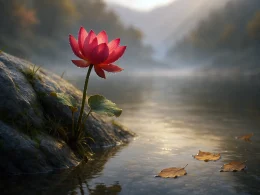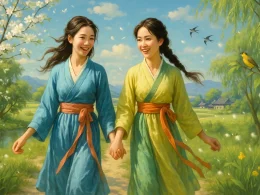After rain the empty mountain
Stands autumnal in the evening,
Moonlight in its groves of pine,
Stones of crystal in its brooks.
Bamboos whisper of washer-girls bound home,
Lotus-leaves yield before a fisher-boat --
And what does it matter that springtime has gone,
While you are here, O Prince of Friends?
Original Poem
「山居秋暝」
王维
空山新雨后, 天气晚来秋。
明月松间照, 清泉石上流。
竹喧归浣女, 莲动下渔舟。
随意春芳歇, 王孙自可留。
Interpretation
This renowned landscape poem was composed during Wang Wei's residence in Wangchuan, located in present-day Lantian, Shaanxi—a serene and picturesque retreat where the poet spent his later years in seclusion. Here, he built his "Wangchuan Villa," often hosting friends for poetic exchanges while embracing a reclusive life immersed in nature. The poem captures the tranquil scenery of mountain forests after rain on an autumn evening, blending natural beauty with humanistic sentiment. It exemplifies Wang Wei's signature style of "painting within poetry and poetry within painting." Beyond depicting refreshing landscapes, the verses embody the poet's ideals of detached elegance and transcendental aesthetic pursuit, standing as one of his most representative mountain-dwelling works.
First Couplet: "空山新雨后,天气晚来秋。"
Kōng shān xīn yǔ hòu, tiānqì wǎn lái qiū.
The empty mountains after fresh rain—
Autumn air arrives with evening’s chill.
The opening lines sketch an idyllic mountain scene. The word "empty" (空) instantly evokes a spacious, hushed atmosphere, as if the valley retains only the rain’s earthy fragrance and crisp air. "Fresh rain" and "evening’s autumn" mark both time and sensory clarity, revealing Wang Wei’s acute awareness of nature’s subtleties. Through these details, he subtly conveys inner peace and contentment.
Second Couplet: "明月松间照,清泉石上流。"
Míng yuè sōng jiān zhào, qīng quán shí shàng liú.
Bright moon shines through pines—
Clear springs flow over stones.
These lines unfold like an ink-wash landscape scroll. Moonlight filters through pine boughs, casting quiet patterns, while springs murmur over rocks—a harmony of motion within stillness. Wang Wei’s "pictorial poetry" shines here, immersing readers in a realm of serene luminosity.
Third Couplet: "竹喧归浣女,莲动下渔舟。"
Zhú xuān guī huàn nǚ, lián dòng xià yú zhōu.
Bamboos rustle—laundry girls return;
Lotus stirs—a fishing boat drifts down.
Human presence gently interrupts the silence: laughter of returning washerwomen and a boat gliding through lotus leaves. These vignettes reflect Wang Wei’s ideal—not utter isolation, but symbiosis with nature and community. The mountain life he cherishes is neither lonely nor mundane, but vibrantly quiet.
Fourth Couplet: "随意春芳歇,王孙自可留。"
Suí yì chūn fāng xiē, wáng sūn zì kě liú.
Let spring’s blooms fade as they will—
This noble heir may linger still.
Alluding to the "Summons for a Recluse" from the Chu Ci, Wang Wei repurposes "noble heir" (王孙) as a self-reference. Amid withering flora, he chooses to remain—a testament to his philosophy of harmony with nature’s cycles and detachment from worldly pursuits. The closing lines distill his Confucian-Daoist blend of principled reclusion.
Holistic Appreciation
The poem ascends through layered artistry: from rain-freshened solitude (Couplets 1–2) to lively human-nature interplay (3), culminating in philosophical resolve (4). Wang Wei’s microscopic attention—dew, moonlight, a boat’s ripple—paints macrocosmic serenity. His scenes balance cool stillness and warm vitality, static beauty and dynamic rhythm, composing a scroll where every stroke breathes.
Artistic Merits
The poem's structure is rigorous and exquisitely composed, with concise language that carries profound meaning. The poet demonstrates remarkable skill in selecting natural imagery rich in artistic conception—such as "empty mountains," "fresh rain," "bright moon," and "clear springs"—to convey emotions through scenery, achieving perfect harmony between scene and sentiment. Particularly ingenious is the artistic treatment of contrasting stillness and motion, and interplay between the tangible and intangible. The first two couplets depict static scenes, while the latter two introduce human voices and boat movements, infusing vitality into the tranquility and enhancing both the visual quality and life force of the poetic imagery. Moreover, the concluding lines reveal the poet's recluse aspirations, elevating the philosophical depth through classical allusions and expanding the intellectual dimension of the poetic realm.
Insights
Wang Wei’s mountains offer more than escape—they model how to inhabit time. In our accelerated era, his poem whispers: slowness is not retreat but recalibration. The "empty" valley, far from barren, brims with unhurried aliveness—a counterpoint to modern fragmentation. To "linger" like Wang Wei is to reclaim agency over attention, to find in a pine’s shadow or a spring’s song a politics of presence.
Poem translator:
Kiang Kanghu
About the poet

Wang Wei (王维), 701 - 761 A.D., was a native of Yuncheng, Shanxi Province. Wang Wei was a poet of landscape and idylls. His poems of landscape and idylls, with far-reaching images and mysterious meanings, were widely loved by readers in later generations, but Wang Wei never really became a man of landscape and idylls.





